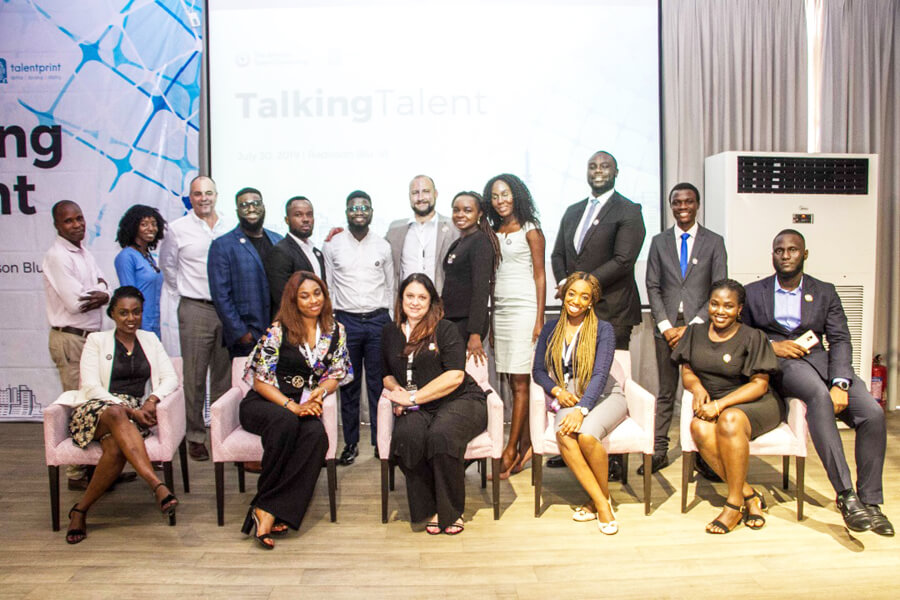TALKING TALENT: HR Experts in Nigeria discuss how to future-proof their business and discover the one thing they desperately need
The cost of a bad hire or exit is on average three times the annual salary of that position, once all bottom-line costs are included in calculations. This is an outrageous cost and one of the reasons HR leaders have to ensure that their companies must hire the right fit and effectively plan for succession, at all levels. One pioneering HR consulting company is trailblazing the course to help Nigerian companies achieve this.
On Tuesday, July 30th, 2019, over 50 HR Experts and Top Business professionals gathered at the Radisson Blu Hotel in Lagos Nigeria to discuss human resource management strategies that help organizations plan for the right hire, identify, develop and retain top-performing talent and position teams for seamless succession.
This event, ‘Talking Talent’, is the maiden edition of a series of HR workshops planned to take place across different countries in Africa and is the brainchild of The African Talent Company (TATC), a Pan-African recruitment firm offering ‘Fit-For-Purpose’ HR solutions across Talent Acquisition, HR Technology, Data Analysis, and Consultancy.

Senior HR professionals from a wide range of top companies and industries, such as Nigerian Breweries, Mondelez, Rand Merchant Bank, Rossetti Pivot, were in attendance as speakers, panelists, and workshop participants.
There were presentations and panel discussions, however, the key activity that struck a chord with the participants was the break-away sessions to deep dive on three key HR pain points: ‘Hiring Right’, ‘Managing Talent’ and ‘Succession Planning’. These one-on-one sessions were respectively led by three talent Gurus: Heather O’Shea – Managing Partner, TATC; Martin Sutherland – Global Director, PeopleTree Group and Brett Mulder – COO, PeopleTree Group.
One insight that stood out, was the fact that succession planning was not commonly practiced at Nigerian companies and that implies that teams do not have the required bench strength and had to be reset whenever top performers leave.
It was quite a revelation as HR leaders at the workshop said they faced challenges which varied from the lack of support from team members who refused to mentor designated successors, to HR teams who did not know how to design and implement a succession plan.
Brett Mulder, who led the breakout group on Succession planning, said, “Succession planning is a risk management strategy to ensure leadership continuity, preserve institutional knowledge and, in most cases, develop talent from within the organisation.
Gaining commitment from the executive and creating a structured roadmap to guide your investment in time, is critical in implementing a plan that ensures successors actually succeed.
Identify key roles for succession, adopt an evidence-based approach to assessing readiness, identify pools of talent that could potentially fill these roles and finally develop employees to be ready for advancement into key roles.”
Heather O’Shea, who focused on hiring right, also said, “Top companies all struggle with getting their workforce planning correct, not knowing when to ‘Buy, Borrow, Build or Bind’ the skill. This can be very costly, from a time, money and emotional perspective and we want to make it easy for HR leaders to understand how to choose the right strategy”. To facilitate this learning, participants were given a free workforce planning template and a demonstration on how to use this template at their respective companies.
During the panel discussion, chaired by Jobberman CEO, Hilda Kragha, she mentioned, “When you find good people, as an organization, you need to make your value proposition interesting for them at every stage of their journey with you, so they are motivated to deliver more, for longer”.
The panel was discussing ‘How to identify top performers and how to retain them’ and had Martin Sutherland on the panel, who also said, “Personalising employee engagement is important, anonymous surveys don’t help you tailor custom retention actions for high-value individuals.”
In engagements with TATC clients in 2019, they asked: “How do I future-proof my business to ensure I have the right skills to continue to grow well past 2020?”.
This was the key pain point, and to address this, TATC decided to not hold “‘another conference”‘ but rather to have a workshop, where TATC could share insights and offer their talent specialists who could bring their expertise to share with clients.
Delegates were offered the opportunity to have one-on-one sessions to speak about their challenges because TATC wanted to offer the expertise to clients in an open, yet intimate forum.
The results were intriguing, as key insights around the challenges HR leaders face in succession planning and workforce planning were discovered and discussed. This is a high-impact workshop series that will occur regularly across the different markets that TATC operate.
Kelechi Deca

Kelechi Deca has over two decades of media experience, he has traveled to over 77 countries reporting on multilateral development institutions, international business, trade, travels, culture, and diplomacy. He is also a petrol head with in-depth knowledge of automobiles and the auto industry.



